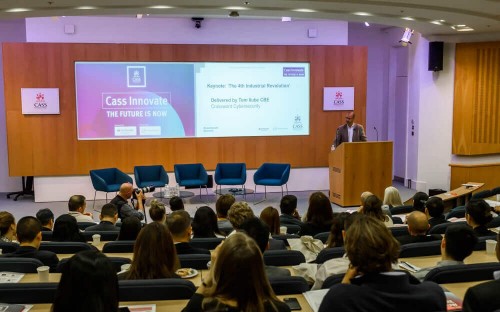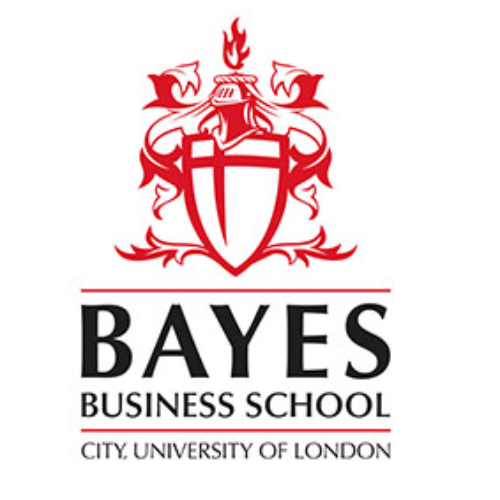The MBA at Cass Business School is about developing innovative students for the future of business. Cass Innovate drives that message home from the get-go
Entrepreneurship has been a hot topic in MBA programs in recent years, and business schools have been busy boosting the benefits of their programs for students interested in starting their own companies.However, a recent report from Carrington Crisp suggests that entrepreneurship is no longer as valued by students as it once was. So, how do business schools adapt to the needs of students for the future?
At , their innovative MBA program aims to equip students with entrepreneurial skills that are valuable in any sector.
“I like to say that being entrepreneurial doesn’t mean that everybody ends up having their own company,” says Aurore Hochard (pictured below, right), head of entrepreneurship programs at Cass. “I think we also need to speak about intrapreneurs, and the benefits of being more entrepreneurial in a corporate environment.
“Everyone needs to become more entrepreneurial. These are concepts that you just can’t ignore. The things that seem to be more like trendy words or buzzwords, like cryptocurrency—it is real.”

Cass Innovate, a school-wide event that focuses on innovation, entrepreneurship, and leadership at Cass, aims to drive that message home from the get-go. Although not aimed primarily at students, Aurore says that this year’s conference resonated particularly with MBAs—it took place during the opening week of the program.
This year's event—organized under the theme ‘The Future Is Now’—tackled a diverse range of topics including artificial intelligence, raising capital through cryptocurrency, as well as what business lessons can be gained from Formula 1. It attracted entrepreneurs from a wide range of business sectors.
Faculty on the —ranked the number five program in the world for entrepreneurship by the Financial Times—are also introducing innovating ways of learning both in the classroom and outside of it to teach their students key future skills.
In 2017 Cass launched the MBA Expeditionary society, which sends MBA students each year on unique 'stretch experiences' led by distinguished mountaineers and explorers, giving students a unique perspective on leadership,
Professor Stefan Haefliger, who spoke on a panel at Cass Innovate about the future of the work, says that global trips help to engage students in a different way, and further develop their entrepreneurial and leadership skills.
“Courage and creativity are skills that you have to learn, and often we mislearn it in school," Stefan notes. "It’s always this balance between 'online' and 'offline' that makes our MBA creative and fun.”

Daniel Gill (pictured right), a recent graduate of the Cass MBA program, says that it's the forward-looking approach to learning that makes Cass unique.
“The technology that is around today is going to be somewhat irrelevant in 20 years, but I still think I’ll be able to process new technology and think about what the advantages of it might be [because of my experience at Cass]."
His former MBA colleague, Mehdi El Azhari, agrees. “You have to keep learning with time, so you don’t become obsolete on the market,” he says. “As a Cass MBA graduate I have one free elective per year for life—so I can come back, sit again with the students of next year, and learn about what has happened this year."
Developing innovative ways of thinking was also a key focus of Cass Innovate. This was no clearer than in the lecture by Dr Paolo Aversa, senior lecturer in strategy and course director of the Full-time MBA at Cass, who BusinessBecause interviewed earlier this year.
His lecture given at the conference, entitled, ‘The future is fast: lessons from Formula 1,’ detailed the ways in which the business sector can learn from a possible unconventional area.
Aurore says that Paolo is a prime example of the kind of experiential and innovative teaching at that is incorporated into the MBA program.
“What I like about Paolo is that he uses his passion to deliver something. I think that's a great skill he’s got, and I think it shows that no matter how technical your ideas are it’s the ability to connect that’s important, so you understand the parallel he’s trying to make,” she says.
One of the aims of Cass Innovate, Aurore adds, was to demonstrate that being an entrepreneur is not something you learn in the books, but that you have to live.
“The biggest skill to develop as an MBA is to be ready for a change that you don't even anticipate—a lot of the connections happen beyond the academic learning.”
Student Reviews
Best Journalism school in Europe
When I first stepped onto the campus of City, University of London, I knew I was in for a ride - and not just on the Tube! With its vibrant energy and an impressive repertoire of programs, City U became my home away from home.
The Journalism program was kind of a big deal. Rumour was that we were the best in Europe!
The lecturers were not just experts in their field; they’re practically journalistic royalty. They were invested, passionate, and had a knack for turning the most flat press release into a riveting news story. With their guidance, I’ve learned to navigate the chaotic world of media like a pro.
The campus was a melting pot of every culture, being that we had such a diverse international crowd.
Being in the heart of London, I had the world at my fingertips - there was always a new corner to explore, a hidden gem of a cafe to discover, or a street performer!
City, University of London wasn't just a university; it was a chapter in my life story that I’ll never forget.
Learning environment
The teacher-learner ration is manageable, giving each learner a chance to gain personal attention. It is also easier following up on the progress of a student, as the numbers per class is not large. the conducive environment for learning includes clean classes, standard desks, world class instructional facilities and the opportunity to engage lecturers even after their sessions. The team spirit at City is above board, with learners getting chance to learn both from instructors and colleagues. This is the university of choice; the place to be.
Classes
I liked that each class had a manageable number of learners, making the professor-learner ratio favor knowledge acquisition. I also liked that study schedules were manageable, and not overwhelming. The focus on talents and gifts even within the learning environment makes it possible for learners to achieve the best of their potential, and this has worked to the advantage of those that have schooled at City, University of London
Classes
The diversity at City University facilitates interactions and is a direction toward the unity of the world. The classes are well built to match the number and needs of all students regardless of the elements of diversity that set people apart. The use of technology in delivery makes learning even more interesting and achievable. At City University there is no distinction pegged on the issues that make people unique.
professors
The team of lecturers at the Uiversity are well experienced. Their level of insight and the methodologies of delivery works for the interes of the leaeners. My learning experience was largely boosted by the level of knowledge of the professors at the institution, and their passion to transfer the same to learners. I appreciate every class I attended because of the level of insight I was able to gather
The best university I’ve been to
The campus and the people I've met have made it a wonderful experience. I was reared in a small town with a graduating class of only 88 individuals, so moving to City University was a huge adjustment for me. My dorm has more residents than my whole high school combined! I enjoy the atmosphere here, and everyone is so friendly. Outstanding academic options and a stunning campus. Really great from beginning to end. The educators genuinely love what they do, and the students are ready to learn. On or around college, there is always something to do with friends, and the social scene is particularly warm.
Bayes Business School
As a student at City university attending Bayes Business School I would totally recommend choosing this university as the experience is exceptional with great social networking opportunities . Professors are significantly helpful, delivering with excellence and professionalism. Everyone is happy to help and make you feel welcomed in such an esteem university as City, offering exceptional development and guidance through out the course.
Economics and Politics
Incredibly amazing university, the way they polish students and help them boost their morale and think intellectually is worthwhile. Many universities have international partnerships to allow exchanges between their students. The most obvious subjects for these opportunities would be those that involve languages, and the study of people and places.
Clinical biology
I really like it it’s perfect for me with not too many people and not too few either. All the modules are amazing. I love the toy bar. I love all the societies that I’ma part of. Especially the colour Bollywood society
Unlocking My Potential at City University London
My time at City University London was truly transformative. The university's vibrant community and diverse extracurricular activities allowed me to forge lifelong friendships and professional connections that extend beyond the classroom. I was impressed by the university's commitment to academic rigor, character development, and personal growth, which created an ideal environment for me to reach my full potential. The research-driven and industry-relevant curriculum provided me with a solid foundation in international business, while the dedicated faculty and staff offered invaluable guidance and support. I feel grateful for the well-rounded education and holistic experience that City University London offered, preparing me for success in my career and beyond.
Rather interesting
The academics are tough, but in a good way. The professors are experts in their fields, so you know you’re learning from the best. They push you to think for yourself and really dive deep into the subjects. But it’s not all about hitting the books; London itself is like an extension of the campus. You’ve got museums, galleries, and just the general buzz of the city to keep you inspired.
Urban campus life
At the University of London, I have experienced dynamic and diverse academic environment where I was challenged by rigorous coursework. You will have the flexibility to choose from the wide range of courses, participate in numerous extra-curricular activities and take advantage of the many opportunities










